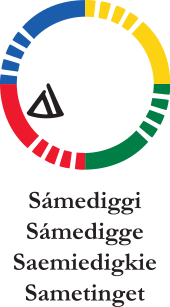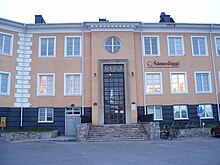The Sámi Parliament of Sweden (Swedish: Sametinget, Northern Sami: Sámediggi, Lule Sami: Sámedigge, Southern Sami: Saemiedigkie) is the representative body for people of Sámi heritage in Sweden based in Kiruna. It acts as an institution of cultural autonomy for the indigenous Sámi people.
Sámi Parliament in Sweden | |
|---|---|
 | |
| Type | |
| Type | |
| History | |
| Founded | 1 January 1993 |
| Preceded by | Swedish Sámi Council |
| Leadership | |
Speaker | Daniel Holst, Hunting and Fishing Sámi since 2021 |
| Structure | |
| Seats | 31[1] |
 | |
Political groups |
|
| Elections | |
Last election | 2021 |
Next election | 2025 |
| Meeting place | |
 | |
| Sámi Parliament of Sweden Building Kiruna, Sweden | |
| Website | |
| www | |
History
editThe Sami Parliament Act, Sametingslag (1992:1433), established the Swedish Sami Parliament as of 1 January 1993. By law, the first official elections were held on 16 May 1993. Its first session was opened by the King of Sweden, Carl XVI Gustaf, on 26 August 1993 in Kiruna. It has 31 representatives, who are elected every four years by general vote. The current chairperson of the Sámi Parliament is Paulus Kuoljak, since 2017. The chairperson is formally assigned by the Swedish Government upon the proposal of the Sami Parliament.
The 2021 Sámediggi Election was held on 16 May 2021, with 9,220 people registered as voters, mostly living in Norrbotten or Västerbotten.[2][3][4]
Responsibilities
editSweden has taken this active part for two reasons:
- to recognise the Sámi minority as an indigenous people to distinguish it from other minorities;
- to raise the Sámi minority influence which comes into conflict with the European majority democracy system, i.e., the group with the most votes wins.
Voting system
editSámi Parliament is democratically elected and acts as an autonomous authority. Sámi inhabitants have a vote, in addition to the regular elections in Sweden, to elect representatives to the Sámi Parliament if:[citation needed]
- they identify as culturally or ethnically Sámi, and either
- they speak a Sámi language, or
- they have had or have a parent, or grandparent, that speaks or spoke a Sámi language
See also
editReferences
edit- ^ "Val till Sametinget 2021 - Valda". val.se. Retrieved 16 June 2021.
- ^ "FALQs: The Swedish Sami Parliament Elections | in Custodia Legis: Law Librarians of Congress". 14 May 2021.
- ^ Ulriksen, Trygve (14 May 2021). "Sweden gets ready for Sami Parliament elections". Sveriges Radio.
- ^ "Nu går samerna till val – många röstade i Kiruna: "Man måste utöva den lilla makt man har"". nsd.se (in Swedish). Retrieved 2023-11-15.